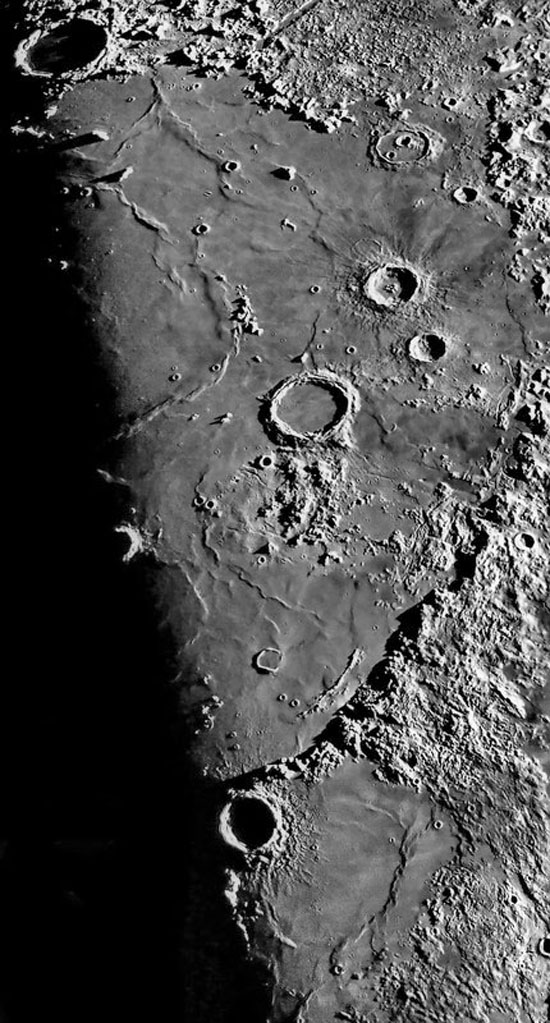Difference between revisions of "January 18, 2009"
| Line 1: | Line 1: | ||
__NOTOC__ | __NOTOC__ | ||
=Classical Imbrium= | =Classical Imbrium= | ||
| − | |||
<!-- ws:start:WikiTextHeadingRule:1:<h1> --> | <!-- ws:start:WikiTextHeadingRule:1:<h1> --> | ||
<!-- ws:start:WikiTextLocalImageRule:7:<img src="/file/view/LPOD-Jan18-09.jpg/53874842/LPOD-Jan18-09.jpg" alt="" title="" /> -->[[File:LPOD-Jan18-09.jpg|LPOD-Jan18-09.jpg]]<!-- ws:end:WikiTextLocalImageRule:7 --><br /> | <!-- ws:start:WikiTextLocalImageRule:7:<img src="/file/view/LPOD-Jan18-09.jpg/53874842/LPOD-Jan18-09.jpg" alt="" title="" /> -->[[File:LPOD-Jan18-09.jpg|LPOD-Jan18-09.jpg]]<!-- ws:end:WikiTextLocalImageRule:7 --><br /> | ||
| − | <em>image by [mailto:patricio@geo.ucm.es Patricio Dominguez], Madrid, Spain</em><br /> | + | <em>image by [mailto:patricio@geo.ucm.es" rel="nofollow Patricio Dominguez], Madrid, Spain</em><br /> |
<br /> | <br /> | ||
| − | This is a glorious mosaic. It is like the classic 1940s Mt Wilson photograph of Imbrium on steroids. The sunrise across east-central Mare Imbrium is perfect for graphically depicting the concentric mare ridges that define the inner rings of the Imbrium Basin. The inner ring that edges the Spitzbergen Mountains is almost continuous, but there are a few odd bits ([http://www.lpod.org/archive/LPOD-2004-09-11.htm Pico and Pico Beta]) that don't seem to fit the larger ring that passes through Ancient Newton, Piton and the Archimedes Mountains. Wouldn't it be lovely to have a similar high res, low Sun, high tonal quality mosaic of western Imbrium - and then we could talk about why the rings there are so much weaker - or even non-existent - compared to the East. Oh, did you notice that [http://lpod.wikispaces.com/January+6,+2009 part] of the image is familiar?<br /> | + | This is a glorious mosaic. It is like the classic 1940s Mt Wilson photograph of Imbrium on steroids. The sunrise across east-central Mare Imbrium is perfect for graphically depicting the concentric mare ridges that define the inner rings of the Imbrium Basin. The inner ring that edges the Spitzbergen Mountains is almost continuous, but there are a few odd bits ([http://www.lpod.org/archive/LPOD-2004-09-11.htm" rel="nofollow Pico and Pico Beta]) that don't seem to fit the larger ring that passes through Ancient Newton, Piton and the Archimedes Mountains. Wouldn't it be lovely to have a similar high res, low Sun, high tonal quality mosaic of western Imbrium - and then we could talk about why the rings there are so much weaker - or even non-existent - compared to the East. Oh, did you notice that [http://lpod.wikispaces.com/January+6,+2009 part] of the image is familiar?<br /> |
<br /> | <br /> | ||
| − | <em>[mailto:tychocrater@yahoo.com Charles Wood]</em><br /> | + | <em>[mailto:tychocrater@yahoo.com" rel="nofollow Charles Wood]</em><br /> |
<br /> | <br /> | ||
<strong>Technical Details</strong><br /> | <strong>Technical Details</strong><br /> | ||
Revision as of 19:03, 4 January 2015
Classical Imbrium

image by " rel="nofollow Patricio Dominguez, Madrid, Spain
This is a glorious mosaic. It is like the classic 1940s Mt Wilson photograph of Imbrium on steroids. The sunrise across east-central Mare Imbrium is perfect for graphically depicting the concentric mare ridges that define the inner rings of the Imbrium Basin. The inner ring that edges the Spitzbergen Mountains is almost continuous, but there are a few odd bits (" rel="nofollow Pico and Pico Beta) that don't seem to fit the larger ring that passes through Ancient Newton, Piton and the Archimedes Mountains. Wouldn't it be lovely to have a similar high res, low Sun, high tonal quality mosaic of western Imbrium - and then we could talk about why the rings there are so much weaker - or even non-existent - compared to the East. Oh, did you notice that part of the image is familiar?
" rel="nofollow Charles Wood
Technical Details
January 4, 2009, 22:30 UT. Celestron CGE 800, Camera DMK 31 AF 03.AS, Infrared filter (Astronomik IR Pro 742)
Related Links
Rükl plates 4, 12, 22 & others.



